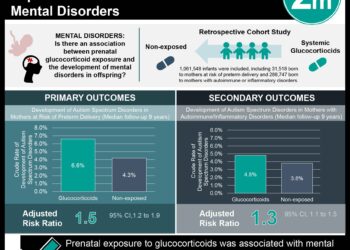#VisualAbstract: COVID-19 pandemic associated with decreased rates of institutional childbirth and increased neonatal mortality in Nepal
1. The COVID-19 lockdown was associated with a significantly increased risk of preterm birth, institutional stillbirth and neonatal mortality in Nepal.
2. The overall number of institutional births were significantly reduced with national lockdown, with increased inequality noted across ethnicities.
Evidence Rating Level: 2 (Good)
Study Rundown: Modelling studies have estimated a significant potential impact of COVID-19 restrictions and lockdown on mortality due to reduced access to maternal and neonatal health services. Low and middle-income countries such as Nepal that have made substantial gains in these regards in recent decades are at greatest risk of being adversely affected as a result of fear of travel and fear of accessing hospital services. There were no previously published studies evaluating changes in quality of care, neonatal or maternal mortality during COVID-19 in this setting.
This prospective cohort study included pregnant women at nine hospitals in Nepal, with data collected over a five-month period before and during national lockdown. Results showed a significant reduction in the mean weekly number of institutional births with the onset on lockdown. The institutional stillbirth and neonatal mortality rates also increased significantly during the lockdown. Quality of care provided in healthcare facilities was also affected, with decreased intrapartum fetal heart rate monitoring and decreased breastfeeding within one hour of birth during the lockdown period. Significant differences in access to institutional childbirth services was seen across ethnic groups, with the relatively advantaged groups having an increase in use and the relatively disadvantaged having a significant decrease during lockdown.
The study was limited in its ability to discern direct maternal-fetal health outcomes associated with COVID-19, and observations of healthcare worker practices limited to vaginal deliveries and not to caesarian births, introducing possible selection bias. Nonetheless, this study was the first to document the effects of maternal-fetal service reduction during the COVID-19 pandemic, and highlights the urgent need to alter care practices for pregnant women and neonates.
Click to read the study in Lancet Global Health
Relevant Reading: Providing maternal health services during the COVID-19 pandemic in Nepal
In-Depth [prospective cohort]: This study included 20,354 pregnant women who gave birth during January to May 2020 (13,189 prior to COVID-19 lockdown, 7,165 during lockdown) in 9 hospitals across Nepal. Women at 22 weeks or greater gestational age with audible fetal heart sounds at admission were eligible for the study. Women who had multiple births and their babies were excluded. Participant level data was collected from two ongoing quality improvement studies and a validated clinical observation checklist was used to record the labor and delivery event for all women with vaginal deliveries. Obstetrics and neonatal data were also collected from patient care notes following delivery.
A 52.4% decrease was observed in the mean number of weekly births after lockdown (651.4, standard error [SE] 49.9) compared to prior to lockdown (1,261.1 births, SE 66.1). A total of 3,467 preterm births were recorded across the study period. The risk ratio of preterm births during lockdown versus prior to lockdown was 1.30 (95% CI 1.20 to 1.40). The institutional stillbirth rate increased from 14 per 1000 births pre-lockdown to 21 per 100 births during lockdown (adjusted risk ratio (ARR) 1.46, 95% confidence interval [CI] 1.13 to 1.89, p=0.0002). Likewise, the institutional neonatal mortality rate increased from 13 per 1000 live births to 40 per 1000 live births (ARR 3.15, 95% CI 1.67 to 6.74, p=0.0022). Compared to practices prior to lockdown, intrapartum fetal heart rate monitoring decreased by 13.4% (95% CI -15.4 to -11.3, p<0.0001) and breastfeeding within one hour of birth decreased by 3.5% (95% CI -4.6 to -2.6, p=0.0032) during lockdown. Socially advantaged ethnic groups (Brahmain and Chhetri-Hill) showed an increase in the use of childbirth services during lockdown compared to pre-lockdown (33.9% of births vs. 30.7% of births, p<0.0001), while more disadvantaged ethnic groups (Madhesi) showed a decrease in healthcare utilization during lockdown (17.1% of births vs 21.5% of births, p=0.0015).
©2020 2 Minute Medicine, Inc. All rights reserved. No works may be reproduced without expressed written consent from 2 Minute Medicine, Inc. Inquire about licensing here. No article should be construed as medical advice and is not intended as such by the authors or by 2 Minute Medicine, Inc.







